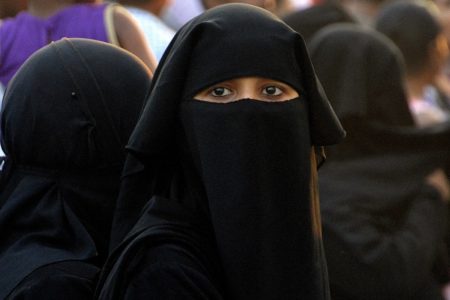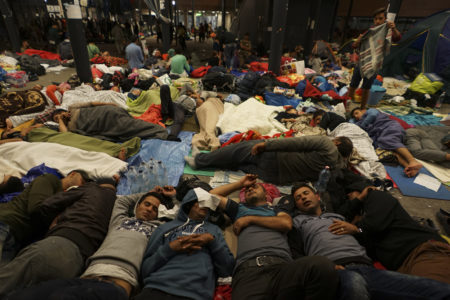Changing Tides is a new series of discussions from Sovereign Nations featuring James Lindsay and Michael O’Fallon.
The tides of change are all around us. At times, the changes are obvious, such as the demand to oppress all things “old” and to forcibly thrust conflict theory into nearly every facet of our lives.
In 2019’s Trojan Horse series, O’Fallon and Lindsay along with Peter Boghossian warned of the coming totalitarian wave of Critical Race Theory, intersectionality, and other forms of radical subjectivism. These ideologies serve as the ruling doctrines of our age and their presence is clearly evident in the topic for this new discussion. Draconian change frequently arrives with propaganda-spiced phrases that confuse the true intentions of its advocates, the same is true of climate justice. In this first episode, O’Fallon and Lindsay sound the warning in regard to climate justice and its contrast with science, real-world problem solving, and self-governance.
Teen Vogue (yes, Teen Vogue) defines climate justice as:
We see the effects of the climate crisis all around us in hurricanes, droughts, wildfires, and rising sea levels, but our proximity to these things, and how deeply our lives are changed by them, are not the same for everyone. Frontline groups have been leading the fight for environmental and climate justice for centuries and understand the critical connections between the climate crisis and racial justice, economic justice, migrant justice, and gender justice. Our personal experiences with climate change are shaped by our experiences with race, gender, and class, as the climate crisis often intensifies these systems of oppression.
In response to this reflexive fertile fallacy, James Lindsay’s New Discourses responds with a mechanistic understanding of the true intentions of climate justice:
Climate justice” is mostly a term used in activism used to take a Social Justice approach to the issue of climate change, particularly issues corollary to and tangential to the issue of climate change itself. While the scholarship on climate change remains largely scientific, a largely distracting interest in climate justice has arisen within activism and some scholarship in the humanities to document how issues related to climate change are best understood primarily as Social Justice issues. In particular, climate justice seeks to reframe the debate about climate change to one about the ways in which climate change will be more detrimental to oppressed people and less detrimental to privileged ones, which compounds injustice. This, the activists involved believe, will increase, rather than decrease, the sense of imperative with regard to addressing climate change.
In practice, climate justice means diverting focus and resources away from pressuring governments to produce, enable, support, or subsidize technologies for carbon-neutral energy production, carbon capture, and energy sustainability and toward more focus on gender, race, previously colonized status, and sexuality as those can be contrived into issues related to climate change. For example, a climate justice approach might argue that programs teaching intersectional feminism and critical race Theory are needed in developing countries, like in Africa, because better understanding how issues relevant to women and racism from a social-theoretical perspective will better inform and motivate us regarding the making of climate-relevant policy, especially with regard to preserving cultural identities and practices (in a pre-industrial setting—see also, cultural relativism). This, rather alarmingly, may also include teaching ideas from postcolonial Theory like that science is a white, Western cultural product and just another “way of knowing.”
The proposed mechanism of climate justice is therefore to prioritize the voices and knowledge(s) of marginalized people on climate, life around climate, and climate change, and an experiential approach is often taken. While good scholarship and activism can focus on the ways in which poorer communities can be less able to mitigate the effects of climate change, and this can be used to craft policy that might mitigate these issues or better take them into account, it is unclear how rooting activism against climate change in theoretical constructs like indigenous queer feminisms (see examples below) will help the situation rather than serve as a politicizing distraction that, at best, makes climate change activism look frivolous and unfocused. Indeed, activism that does posit climate change to be a common struggle is likely to gain more support than one that makes it a problem of people with many overlapping vectors of marginalization. The co-optation of climate change into identity-based activism—and thus making it a far-left political issue—is probably aggravating and certainly not helping to ameliorate climate denialism among those on the right wing.
Men and women who value liberty, freedom, autonomy, and sovereignty need to understand what the threat of the global implementation of climate justice will bring to their lives.
The audio version of this presentation is available on Soundcloud, Google Podcasts, Apple Podcasts, Spotify, & Stitcher.







Becky
I feel that James Lindsay has completely missed the point about what BLM and Extinction Rebellion are. His argument seems to be that these movements, that aim to raise awareness of important issues such as racial discrimination and climate change, are bad because they are not doing science. They’re not supposed to be doing science. That’s not the point of their existence. Their objective is to change behaviour and attitudes. Not research ways to reduce carbon emissions. His argument is like saying “This hairdresser is rubbish because she’s not qualified to do brain surgery”. What a waste of everyone’s time. *Sighs*